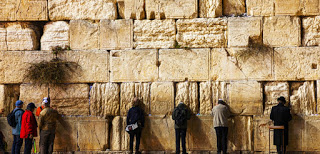THE IMPRISONED REVELATION
It is true that God, the Creator, revealed himself
to Israel and no other nation. That fact is a cause for honor. Being the people
through which divine Revelation entered the world is something sublime. Yes,
Israel is god's "personal treasure"(Exodus19.5), not because it is
better than other nations, but because He wanted it so, that is, for his grace
and his love for these people. So much so that Moses said that God would give
Israel a position of glory, fame, and honor far above all nations (Deuteronomy26.19).
Not in a secular but spiritual sense: "you will be for me a kingdom of
priests, a holy nation" (Exodus19.6).
But they did not understand this word of Moses and
secularized themselves. They took their eyes off God and began to look at the
other nations, wishing to be like them. Rejecting theocracy, they asked for a
king, a monarchy. The Prophet Samuel grieved himself, but God said to him,
“listen to all that the people are saying to you; it is not you they have
rejected, but they have rejected me as their king... forsaking me and serving
other gods” (1 Samuel8.4-8). Then Israel structured itself like the other peoples
even in the religious aspect.
They turned Revelation into a religion whose center
was the life of the temple, erected by Solomon. They thought they could
domesticate Yahweh to be their particular God, limiting him to his
interpretations. But the Lord did not consent, so much that he allowed the
temple to be destroyed twice and that, over its ruins, a Muslim mosque would be
erected. Jesus himself dedicated his entire ministry to a process of
deconstruction of this religiosity. Instead of going to the nations to announce
Yahweh, they closed themselves.
This idea of taking Revelation for himself, not
sharing it with other peoples, became so strong in Israel that archaeologists
found in the ruins of the temple, on the wall that separated the women's
courtyard from the area where the Gentiles (non-Jews) were located, two
occurrences of the following inscription: "no foreigner should enter the
courtyard or pass through the balustrada around the sanctuary. Whoever is
caught will be guilty of his subsequent death". The Gentile was prevented
from entering the temple to worship. But God cares about all nations, so much
so that he directed Peter to evangelize the Roman captain Cornelius and Jesus
did not deny a miracle to a Cananite woman and even directed the disciples to
take the gospel to the ends of the earth (Matthew 24:14; Acts 1:8).
There is no problem with temples, or rituals as
long as we will not idolize them. God allowed the construction of the temple of
Jerusalem and guided the liturgy of worship. But these things are just external
representations of faith. Our devotion to them cannot be greater than God. The
Apostle Paul, writing to the Corinthians, said that we are the temple of the
Holy Spirit (1 Corinthians6:19). We need to build a place of worship to God in
our hearts and minds so that our lives are a constant cult to Him. Thus, we
will be, as Jesus said, light in darkness and salt in the world
(Matthew5:13,14).
Israel's experience is similar to that of the
prophet Jonah who, being commissioned by God to go to Nineveh to preach divine
salvation, did not obey and took another destiny. But God allowed him to go
through adversity and then led him to that city, where he announced the Lord
and all Nineveh converted. The Israelite nation today is far from God, but the
Lord has not rejected it. The Apostle Paul said that there will come a time
when all Israel will be saved (Romans11.26) and the Apostle John said that the chosen
people will be on the front line of spiritual struggle in the Great
Tribulation, honoring God with his testimony and sacrifice , as well as
multitudes of all peoples, tribes, languages, and nations that will surrender
to God (Revelation7)
Antonio Maia - M. Div.
Copyright
[1] SCOTT. J. Julius. Origens Judaicas do Novo
Testamento. Um Estudo do Judaísmo
Intertestamentário. Shedd Publicações, 2017 p.51



Comments
Post a Comment